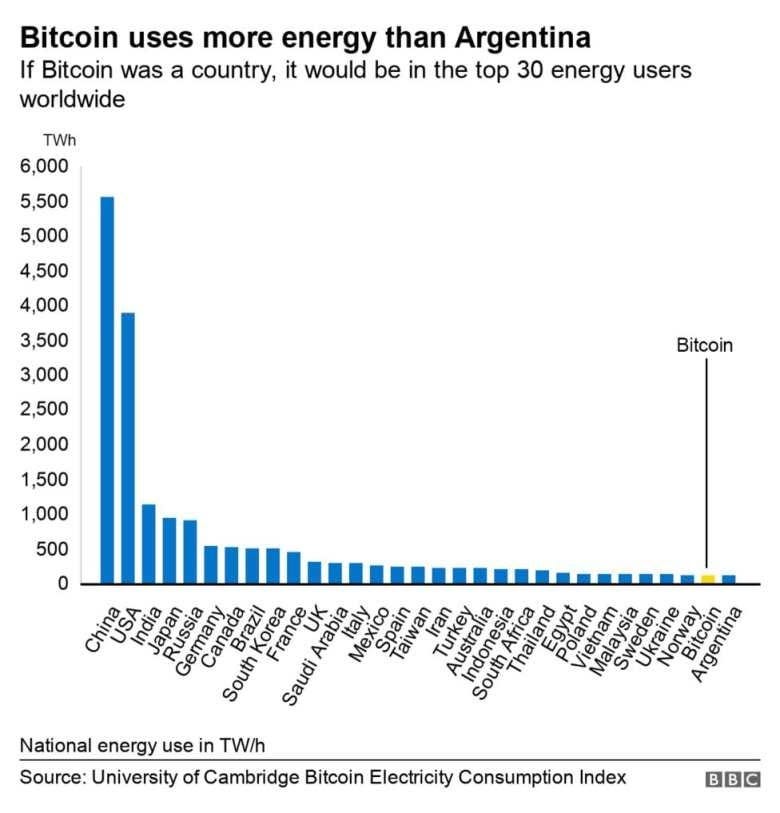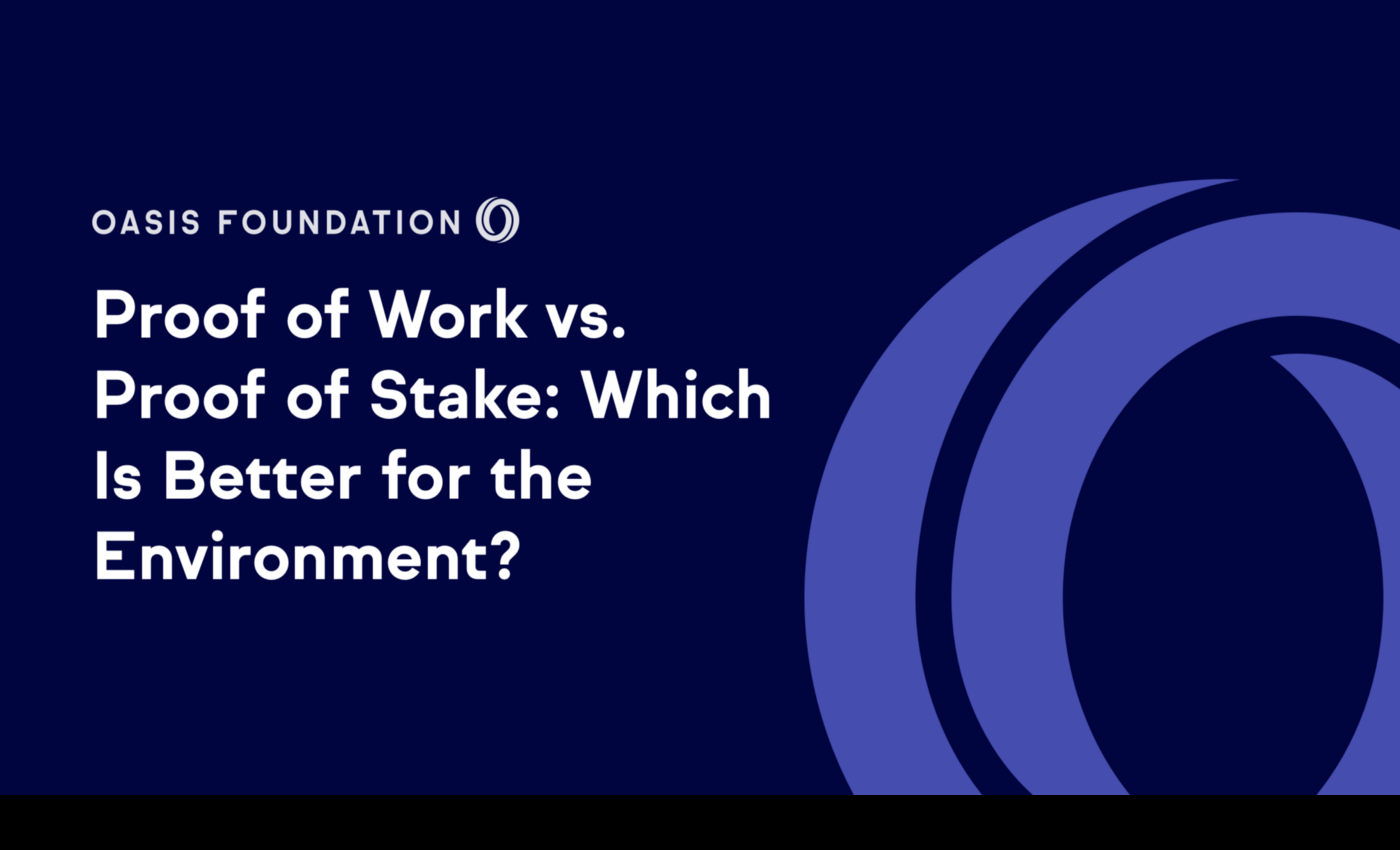Oasis is a privacy-enabled, Layer 1 proof-of-stake decentralized network, built for decentralized finance and a responsible, user-owned data economy.
Client: Oasis Foundation
Website: oasisprotocol.org
Token: ROSE
Client: Oasis Foundation
Website: oasisprotocol.org
Token: ROSE
Link to original article online: https://medium.com/oasis-protocol-project/proof-of-work-vs-proof-of-stake-which-is-better-for-the-environment-d6ca69a61411
Sometimes links get changed, which is out of our control, so here’s a PFD download of the article, as well as a text version below.
![]()
Community Translations: Portuguese
With the world having become more environmentally conscious, the recent discourse in the crypto space has likewise shifted to the impact of cryptocurrencies on the environment. One of the ongoing debates in the community relates to how the Proof of Work (PoW) consensus mechanism impacts the environment versus Proof of Stake (PoS), the consensus mechanism used on the Oasis blockchain.
Although this debate has been going on for quite a while, it was this tweet by Tesla CEO, Elon Musk, that really re-ignited the conversation — and with good reason. His tweet expressed concern regarding the use of fossil fuels for mining Bitcoin, and his sentiment spurred heated debates around the industry. Just a few days following his initial comments, Musk met with leading bitcoin miners, in an attempt to better understand the environmental impact of cryptocurrencies and to hear out what the current and future solutions could look like.
So in this post we’ll take a look at how PoW and PoS work, how they differ, and how each of them affects our environment. Our hope is that you get a good grasp of how this landscape is developing and how blockchain will continue to change the world we live in.
Blockchain consensus mechanisms work toward achieving the necessary agreement on a single data value or a single state of the network among distributed processes. Put another way, they help guarantee that transactions on a blockchain are legitimate. This kind of mechanism is absolutely essential in decentralized blockchains as it guarantees the sanctity of each transaction on the system and creates a consensus of all participants on the status of the ledger.
That said, two of the most popular consensus algorithms are Proof of Work (PoW) and Proof of Stake (PoS). In PoW, miners are essentially competing with each other to solve complex mathematical equations. The algorithm rewards the participant node that solves the problem the fastest and grants them the right to add new transactions to the blockchain.
On the other hand, with PoS, the validator keeps a certain value of their own possession of cryptocurrency as collateral — referred to as their ‘stake’. The algorithm periodically rewards one of the validators with the privilege to create the next block in the blockchain. This allocation of responsibility to maintain the public ledger is in proportion to their stake in the network.
The most common criticism of the PoW consensus algorithm is that it requires a large amount of electricity to run the network. According to research conducted by the University of Cambridge, the annual electricity consumption by Bitcoin (bar for the largest PoW blockchain) accounts for an estimated 0.6% of global energy usage.

And although this seems like a very large amount of energy to consume for a cryptocurrency, Bitcoin advocates argue that this figure is even less than 10% of what the conventional banking system uses.
Bitcoin supporters also maintain that a significant amount of the energy used by cryptocurrency comes from renewable sources and that Bitcoin mining uses a large amount of energy that would otherwise be wasted. This has become such a hot topic that the government of Sichuan, a province in China, is hosting a seminar to gauge a potential bitcoin mining ban on the hydropower community.
Generally speaking, PoS is considered much more energy efficient and the adoption rate of PoS based blockchains far outnumber PoW based blockchains. An article by Fast Company details how computing power becomes much less of a factor with PoS — with the second largest crypto project by market cap, Ethereum, currently migrating over to PoS from PoW — citing reasons of scalability, speed, and efficiency. For many in the blockchain space, this fact alone serves as the ultimate validation for the overall use case of PoS.
Through migrating over to PoS, Ethereum plans to cut out 99% of the energy it consumes and in the words of Ethereum founder, Vitalik Buterin, “It’s widely accepted in the Ethereum community that PoW uses far too much energy. For me it is the №1 priority.” Sentiments like this naturally reverberate through the crypto space and it’ll likely convince more new and upcoming projects to adopt PoS over PoW.
But although PoS is more energy efficient than the PoS consensus model, its carbon footprint is still larger than centralised digital transaction solutions like VISA, and this fact has helped spearhead different consensus models such as Proof-of-Authority (PoA).
Blockchain technology holds immense potential and the crypto community is actively seeking to address energy issues associated with the use of cryptocurrency. And even though many blockchains are adopting PoS over PoW, environmental solutions in crypto should not only depend on what consensus mechanism a project uses. A more robust and wider approach is needed that makes use of renewable energy sources along with a number of other innovative solutions. And while PoS supporters tout the energy-saving potential of this particular consensus, PoW certainly has its benefits too. For the time being however, it’s quite clear that PoS uses less energy, and for now we can safely say it has a lesser impact on our environment.
Sometimes links get changed, which is out of our control, so here’s a PFD download of the article, as well as a text version below.

Proof of Work vs. Proof of Stake: Which Is Better for the Environment?
Community Translations: Portuguese
With the world having become more environmentally conscious, the recent discourse in the crypto space has likewise shifted to the impact of cryptocurrencies on the environment. One of the ongoing debates in the community relates to how the Proof of Work (PoW) consensus mechanism impacts the environment versus Proof of Stake (PoS), the consensus mechanism used on the Oasis blockchain.
Although this debate has been going on for quite a while, it was this tweet by Tesla CEO, Elon Musk, that really re-ignited the conversation — and with good reason. His tweet expressed concern regarding the use of fossil fuels for mining Bitcoin, and his sentiment spurred heated debates around the industry. Just a few days following his initial comments, Musk met with leading bitcoin miners, in an attempt to better understand the environmental impact of cryptocurrencies and to hear out what the current and future solutions could look like.
So in this post we’ll take a look at how PoW and PoS work, how they differ, and how each of them affects our environment. Our hope is that you get a good grasp of how this landscape is developing and how blockchain will continue to change the world we live in.
Understanding Consensus Mechanisms
Blockchain consensus mechanisms work toward achieving the necessary agreement on a single data value or a single state of the network among distributed processes. Put another way, they help guarantee that transactions on a blockchain are legitimate. This kind of mechanism is absolutely essential in decentralized blockchains as it guarantees the sanctity of each transaction on the system and creates a consensus of all participants on the status of the ledger.
That said, two of the most popular consensus algorithms are Proof of Work (PoW) and Proof of Stake (PoS). In PoW, miners are essentially competing with each other to solve complex mathematical equations. The algorithm rewards the participant node that solves the problem the fastest and grants them the right to add new transactions to the blockchain.
On the other hand, with PoS, the validator keeps a certain value of their own possession of cryptocurrency as collateral — referred to as their ‘stake’. The algorithm periodically rewards one of the validators with the privilege to create the next block in the blockchain. This allocation of responsibility to maintain the public ledger is in proportion to their stake in the network.
The Environmental Impact of PoW and PoS
The most common criticism of the PoW consensus algorithm is that it requires a large amount of electricity to run the network. According to research conducted by the University of Cambridge, the annual electricity consumption by Bitcoin (bar for the largest PoW blockchain) accounts for an estimated 0.6% of global energy usage.
And although this seems like a very large amount of energy to consume for a cryptocurrency, Bitcoin advocates argue that this figure is even less than 10% of what the conventional banking system uses.
Bitcoin supporters also maintain that a significant amount of the energy used by cryptocurrency comes from renewable sources and that Bitcoin mining uses a large amount of energy that would otherwise be wasted. This has become such a hot topic that the government of Sichuan, a province in China, is hosting a seminar to gauge a potential bitcoin mining ban on the hydropower community.
So How Does PoS Compare to PoW?
Generally speaking, PoS is considered much more energy efficient and the adoption rate of PoS based blockchains far outnumber PoW based blockchains. An article by Fast Company details how computing power becomes much less of a factor with PoS — with the second largest crypto project by market cap, Ethereum, currently migrating over to PoS from PoW — citing reasons of scalability, speed, and efficiency. For many in the blockchain space, this fact alone serves as the ultimate validation for the overall use case of PoS.
Through migrating over to PoS, Ethereum plans to cut out 99% of the energy it consumes and in the words of Ethereum founder, Vitalik Buterin, “It’s widely accepted in the Ethereum community that PoW uses far too much energy. For me it is the №1 priority.” Sentiments like this naturally reverberate through the crypto space and it’ll likely convince more new and upcoming projects to adopt PoS over PoW.
But although PoS is more energy efficient than the PoS consensus model, its carbon footprint is still larger than centralised digital transaction solutions like VISA, and this fact has helped spearhead different consensus models such as Proof-of-Authority (PoA).
Closing Thoughts
Blockchain technology holds immense potential and the crypto community is actively seeking to address energy issues associated with the use of cryptocurrency. And even though many blockchains are adopting PoS over PoW, environmental solutions in crypto should not only depend on what consensus mechanism a project uses. A more robust and wider approach is needed that makes use of renewable energy sources along with a number of other innovative solutions. And while PoS supporters tout the energy-saving potential of this particular consensus, PoW certainly has its benefits too. For the time being however, it’s quite clear that PoS uses less energy, and for now we can safely say it has a lesser impact on our environment.